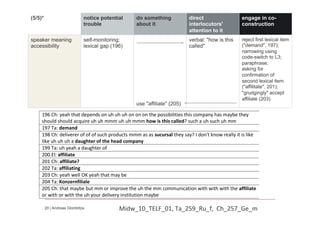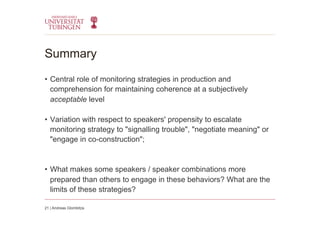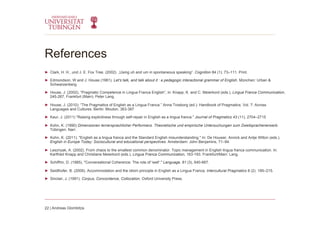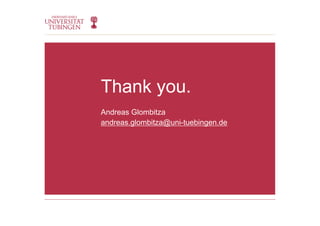Creating Coherence in Ad-hoc ELF Conversations
- 1. 05.09.2013 Andreas Glombitza English Seminar Creating coherence in ad-hoc ELF conversations
- 2. Coherence in ELF conversations ÔæáÔÇ» Conversational coherence ÔæíÔÇ» Centrifugal forces in (T)ELF conversations ÔæóÔÇ» Centripetal strategies -ÔÇ» Enhancing hearer message relevance ´éºÔÇ» comprehension monitoring -ÔÇ» Enhancing speaker meaning accessibility ´éºÔÇ» monitoring for feedback ´éºÔÇ» self-monitoring ÔæúÔÇ» Summary 2 | Andreas Glombitza
- 3. Coherence in conversation " [ÔǪ] What one speakers says in a conversation [is] heard as following sensibly from what another has said [...]". (Schiffrin 1985: 640) Shared responsibility for coherence -ÔÇ» "a speaker is expected to formulate an utterance so that its message is accessible [ÔǪ]". ´éºÔÇ» S signals what info will suffice as a minimally coherent response -ÔÇ» "the hearer [ÔǪ] is expected to demonstrate, through the next utterance, proper attention to that message." ´éºÔÇ» H signals coherence by providing that info or otherwise relating to it 3 | Andreas Glombitza
- 4. Make your contribution such as is requiredÔǪ Coherence and conversational maxims ÔÇóÔÇ» Speaker maxim: "make your message accessible" -ÔÇ» cp. Gricean maxim of manner (be brief, orderly, perspicuous, unambiguous) ´âá we will generally expect S to perform according to his/her own abilities and preferences (and make him/her feel like he/she does) ÔÇóÔÇ» Hearer maxim: "relate your response to S's previous message" -ÔÇ» cp. Grice's maxim of relation ´âáwe will generally expect H to be relevant (and treat him/her as if she is) Consequence: "normalization" of the conversation surface, strategy of "pretending to understand" (cp. House 2010: 368) 4 | Andreas Glombitza
- 5. TELF discussions ÔÇóÔÇ» a fixed topic/task (short, written description of a business-world problem) ´âáÔÇ»webapp: a collection of transcripts & a conversational corpus with attached speaker-metadata and -retrospective data database ´âáÔÇ»~40.000 words, 3.000 turns, 60 subjects (11NS/49NNS) 5 | Andreas Glombitza ´âá telf.uni-tuebingen.de
- 6. "Centrifugal forces" in (T)ELF discussions ├á´âá loose overall discussion structure tendency for "favourite individual topics" ("own agenda" cp. House 2002) non-linear discussion process ("once again, back to start"), abrupt topic changes (cp. Lesznyak 2002, House 2002) speaker-meaning accessibility creative/unconventional usage of words (reliance on "open choice", cp. Seidlhofer 2009) "covert ambiguities" (e.g. stocks, recall) ambiguous pronunciations (e.g. [recreate] for recruit) interlocutors' general attention problems (due to monitoring strain) hearer-message relevance speaker meaning inaccessible (let-it-pass, "normalization" cp. House 2002, 2010) lack of gambits / supporting moves (cp. House 2002) hearer pursuing "own agenda hearer message not accessible (see above) 6 | Andreas Glombitza
- 7. Centripetal strategies ÔÇô monitoring and repair 7 | Andreas Glombitza (also cp. Kohn 1990) notice potential trouble do something about it direct interlocutors' attention to it engage in co- construction speaker meaning accessibility self-monitoring feedback monitoring reorganize, rephrase rephrase signal gap, uncertainty, correction request feedback , confirmation give further clues, accept or decline offers negotiate own meaning hearer message relevance comprehension monitoring use inferences to bridge gaps align response to speaker's message signal comprehension gap negotiate interlocutor's meaning escalation levels
- 8. COMPREHENSION- MONITORING Noticing trouble in understanding interlocutor's message that may endanger relevance of next own contribution 8 | Andreas Glombitza
- 9. 9 | Andreas Glombitza (1/3) notice potential trouble do something about it direct interlocutors' attention to it engage in co- construction hearer message relevance comprehension monitoring: seemingly non- compatible lexical item (119) form a contextually appropriate hypothesis: "rehire" (Br, Ni) / "recruit" (Al) - -
- 10. 10 | Andreas Glombitza (2/3) notice potential trouble do something about it direct interlocutors' attention to it engage in co- construction hearer message relevance comprehension monitoring: uncertain illocutionary force / propositional content of Ja's utterance (37) form a contextually appropriate hypothesis about IF and propositional content (proposing to wait) revise hypothesis to the effect that Ja intends to warn (IF) from potential side effects of this plan (waiting); ask for confirmation of hypothesis by paraphrasing IF and propositional content of Ja's previous turn (40) get negative response on paraphrase and a re-phrased message from Ja (41) 37 ╠²Ja: ╠²[ ╠²And ╠²so ╠²if ╠²] ╠²if ╠²we're ╠²if ╠²we're ╠²pushing ╠²this ╠²back ╠²what ╠²is ╠²that ╠²going ╠²to ╠²what ╠²is ╠²that ╠²going ╠²to ╠² mean? ╠²I ╠²mean ╠²in ╠²certain ╠²circumstances ╠²I ╠²can ╠²see ╠²that ╠²m ╠²meaning ╠²that ╠²we ╠²would ╠²fold ╠²under ╠²the ╠² pressure ╠²not ╠²having ╠²the ╠²right ╠²of ╠²a ╠²lot ╠²of ╠²money. ╠²But ╠²it's ╠²just ╠²an ╠²idea. ╠² 38 ╠²El: ╠²Yea. ╠² 39 ╠²Ja: ╠²Instead ╠²of ╠²no ╠²more. ╠² 40 ╠²El: ╠²So ╠²you're ╠²you're ╠²proposing ╠²not ╠²to ╠²go ╠²public ╠²on ╠²that ╠²date, ╠²but ╠²to ╠²wait? ╠²[ ╠²Are ╠²your ╠²argument ╠²] ╠² 41 ╠²Ja: ╠²[ ╠²Uhm ╠²no ╠²] ╠²I ╠²mean ╠²I ╠²I ╠²think ╠²that's ╠²a ╠²I ╠²think ╠²that's ╠²a ╠²great ╠²[ ╠²idea ╠²], ╠²but ╠²I ╠²think ╠²another ╠²another ╠² problem ╠²that ╠²we ╠²have ╠²another ╠²issue ╠²that ╠²we ╠²have ╠²to ╠²face ╠²is ╠²wha ╠²what ╠²does ╠²that ╠²what ╠²would ╠²that ╠² mean ╠²for ╠²for ╠²a ╠²company ╠²for ╠²the ╠²money ╠²that ╠²we're ╠²we're ╠²going ╠²to ╠²become ╠²we're ╠²going ╠²to ╠²be ╠²uhm ╠² bring ╠²in. ╠² 42 ╠²El: ╠²That's ╠²a ╠²good ╠²point. ╠² Midw_0910_ELF_05, ╠²Ja_247_En_m, ╠²El_246_It_f ╠²
- 11. 11 | Andreas Glombitza (3/3) notice potential trouble do something about it direct interlocutors' attention to it engage in co- construction hearer message relevance comprehension monitoring: uncertain propositional meaning contribution of "benefits" (41) phrase relevant response (rejection of Ta's argument) (43) utter item with rising intonation; attach "sorry" with rising intonation acknowledge elaboration (43: "yeah") receive elaboration on the previous turn, focusing on "benefits " (42) Excerpt 23 ╠² 39 ╠²Ch: ╠²so ╠²if ╠²you ╠²are ╠²allowed ╠²to ╠²go ╠²or ╠²not ╠²yeah ╠²[ ╠²maybe ╠²] ╠² 40 ╠²Ta: ╠²[ ╠²and ╠²how ╠²] ╠²it ╠²influences ╠²your ╠²benefits ╠²in ╠²that ╠²time ╠² 41 ╠²Ch: ╠²benefits? ╠²sorry? ╠² 42 ╠²Ta: ╠²benefits ╠²I ╠²mean ╠²the ╠²this ╠²company ╠²you've ╠²just ╠²said ╠²that ╠²it ╠²will ╠²take ╠²a ╠²long ╠²time ╠²to ╠²make ╠²a ╠² control ╠²of ╠²all ╠²the ╠²things ╠²and ╠²in ╠²that ╠²time ╠²the ╠²company ╠²could ╠²have ╠²sold ╠²so ╠²many ╠²goods ╠²they ╠²were ╠²of ╠² a ╠²good ╠²quality ╠²but ╠²they ╠²will ╠²influence ╠²their ╠²benefits ╠² 43 ╠²Ch: ╠²yeah ╠²but ╠²isn't ╠²it ╠²possible ╠²to ╠²sell ╠²it ╠²parallelly ╠² 44 ╠²Ta: ╠²parallelly? ╠²[ ╠²what ╠²do ╠²you ╠²] ╠²mean? ╠² 45 ╠²Ch: ╠²[ ╠²yeah ╠²] ╠² 46 ╠²Ch: ╠²at ╠²the ╠²same ╠²[ ╠²time ╠²] ╠² Midw_10_TELF_01, ╠²Ch_257_Ge_m, ╠²Ta_259_Ru_f ╠²
- 12. FEEDBACK-MONITORING Noticing indicators of non-comprehension while phrasing a message 12 | Andreas Glombitza
- 13. 13 | Andreas Glombitza (2/2) notice potential trouble do something about it direct interlocutors' attention to it engage in co- construction speaker meaning accessibility notice absence of expected feedback (receipts / okays / go-ons) proceed elicit feedback using "appealer" moves (cp. Edmondson/House 1981) get confirmation from Pr (121, 127) 120$Al:$But$we$don't$know$if$if$if$this$kind$of$technical$um$invention$has$already$saved$a$life.$So$we$ can't$prove$it$you$know$what$I$mean?$$ 121$Pr:$yes$ [...]$ 126$Al:$but$um$if$we$just$check$them$it$would$be$a$compromise$because$we$are$not$really$sure$that$ this$this$intercom$already$saved$a$life$you$know$what$I$mean?$$ 127$Pr:$yes$ A:$when$I$talk$a$long$time$and$try$to$explain$something$orIor$my$idea,$I$ask$the$question$"do$you$ know$what$I$mean?"$because$I$was$not$sure$if$they$were$getting$my$idea$because$they$were$like$ still$and$I$donÔÇÖt$know$if$they$were$thinking$about$what$they$were$saying$or$just$donÔÇÖt$getting$what$I$ donÔÇÖt$get$get$$ I1:$How$could$you$tell$that$they$werenÔÇÖt$sure$about$your$ideas?$$ A:$because$nobody$was$saying$like$okay$okay$or$saying$nothing.$They$just$aaah$were$silent.$ Midw_1112_ELF_01,$Pr_270_It_f$,$Al_272_Sp_f$retrospective$comment$
- 14. 14 | Andreas Glombitza (2/2) notice potential trouble do something about it direct interlocutors' attention to it engage in co- construction speaker meaning accessibility feedback monitoring: notice attributable silence on part of interlocutor (146) repeat and rephrase previous message (149) (cp. Kaur 2012) ask for comprehension (potential FTA, 147) receive uncertain answer from Da (148) 140$Ja:$(to$Da)$I$don't$think$so$because$the$is$uhm$also$the$pediatrics$they$commended$it$to$the$ customers$just$for$this$one$function$what$is$to$monitor$a$baby's$pulse$rate$[$and$][141$Jo:$Mhm$ ][142$Da:$Mhm$]$$it's$really$what$says$it$I$think$because$you$have$a$lot$of$intercoms$for$babies$but$ this$one$is$specif$specific$with$[$this$function$]$[143$Jo:$Mhm$]$and$I$think$if$you$want$just$an$just$ intercom$if$you$buy$just$intercom,$but$if$you$want$this$one$[$you$]$[144$Jo:$yea$]$buy$this$one$ because$of$the$function$and$I$don't$think$so$if$you$buy$it$you$don't$use$it,$it's$nonsense.$[$You$]$[145$ Jo:$Yea$uhm]$buy$it$because$you$want$use$it$and$you$can$can't$not$that$uhm$from$the$10,000$just$ to$use$it$you$cannot$count$it$because$I$think$the$people$know$what$they$bought$and$they$use$it$for$ this$reason$ 146$Da:$(long$pause)$Mhm$$right$ 147$Ja:$(to$Da)$Do#understand#what#I#mean?$ 148$Da:$Yea$I$think$so.$Uhm$ 149$Ja:$It$will$be$something$else$if$it$will$be$just$one$function$of$many$ 150$Da:$Mhm$ 151$Ja:$but$I$think$it's$in$this$case$it's$the$main$function$ 152$Jo:$Ja$f$alright$ 153:$Da:$Right$right$[well$I$think$]$that$this$ Ja:$Erm$IÔÇÖm$still$not$sure$that$Da$did$understand$the$thing$I$tried$to$explain$it$but$IÔÇÖm$not$sure$itÔÇÖs$ okay$letÔÇÖs$see$maybe$it$will$be$okay$just$erm$confused$if$we$are$on$the$same$line$ $ Midw_08_NNSD_04, ╠²Ja_008 ╠²retrospec7ve ╠²comment ╠²
- 15. SELF-MONITORING Noticing trouble that may endanger own-message accessibility 15 | Andreas Glombitza
- 16. 16 | Andreas Glombitza (1/5) notice potential trouble do something about it direct interlocutors' attention to it engage in co- construction speaker meaning accessibility self-monitoring: creative license with lexical item (351) - (laughter by Pr)? 351$Pr:$they$should$be$lucky$that$um$because$if$um$the$mass$media$know$about$it,$it$would$be$ catastrophical$$ Pr:$I$don't$know$if$this$word$exists$in$English.$"Catastrophical",$you$know.$$ I1:$do$you$have$another$way$you$would$say$it?$$ Pr:$this$"disaster"$should$be$$ Midw_1112_ELF_01,$Pr_270_It_f$retrospective$comment$ (laughs)
- 17. 17 | Andreas Glombitza (2/5)* notice potential trouble do something about it direct interlocutors' attention to it engage in co- construction speaker meaning accessibility self-monitoring: ? avoid conditional construction? incongruent choice of personal pronoun self-initiated rephrasal to "it's not a problem" (simplify) self-initated self- correction to "they" signal correction "uhm" (cp. Clark and Fox Tree 2002) - 18 ╠²Ed: ╠²Yea, ╠²I ╠²think ╠²that ╠²uhm ╠²if ╠²the ╠²purpose ╠²of ╠²the ╠²company ╠²is ╠²uhm ╠²earn ╠²earn ╠²money ╠²it ╠²doesn't ╠² matter, ╠²it ╠²doesn't ╠²uhm ╠²it's ╠²not ╠²it's ╠²not ╠²a ╠²problem, ╠²yea? ╠²But ╠²if ╠²you ╠²uhm ╠²think ╠²in ╠²a ╠²social ╠²err ╠²point ╠²of ╠² view ╠²it ╠²could ╠²be ╠²err ╠²a ╠²problem, ╠²yea? ╠²Because ╠²uhm ╠²it ╠²is ╠²a ╠²part ╠²of ╠²some ╠²uhm ╠²I ╠²don't ╠²know ╠²solution, ╠²it ╠² could ╠²be ╠²a ╠²good ╠²solution ╠²for ╠²uhm ╠²the ╠²so ╠²only ╠²infant ╠²death, ╠²yea? ╠²It ╠²doesn't ╠²work ╠²err ╠²well ╠²so ╠²he ╠²have ╠² to ╠²they ╠²have ╠²to ╠²improve ╠²something ╠²err ╠²better ╠²to ╠²to ╠²get ╠²uhm ╠²good ╠²err ╠²solution ╠²or ╠²everything. ╠² Midw_07_MON_03, ╠²Ed_033_Sp_m ╠² ╠² 118 ╠²Al ╠²: ╠²[ ╠²Yea ╠²], ╠²but ╠²how ╠²[ ╠²do ╠²you ╠²know ╠²it ╠²]? ╠²[ ╠²How ╠²do ╠²you ╠²know ╠²it ╠²doesn't ╠²work? ╠²] ╠²[ ╠²because ╠²it ╠² doesn't ╠²make ╠²] ╠²it ╠²doesn't ╠²i ╠²it ╠²doesn't ╠²make ╠²any ╠²sounds ╠²[ ╠²so ╠²if ╠²the ╠²if ╠²the ╠²] ╠²if ╠²the ╠²baby ╠²is ╠²not ╠²good ╠² good ╠²good? ╠²Err ╠²healthy ╠²yea ╠²uhm ╠²yo ╠²you're ╠²just ╠²not ╠²gonna ╠²know ╠²[ ╠²because ╠²if ╠²] ╠²it ╠²doesn't ╠²make ╠²any ╠² sounds ╠²I ╠²err ╠²f ╠²soun. ╠²I ╠²thi ╠²yea ╠²err ╠²I ╠²think ╠²it's ╠²a ╠²good ╠²sign ╠²so ╠²[ ╠²that's ╠²the ╠²problem ╠²]. ╠² Midw_08_NNSD_05, ╠²Al_001_Fr_m ╠² ╠² 8 ╠²Jo: ╠²mhm ╠²but ╠²erm ╠²the ╠²sensors ╠²(hesitatingly) ╠²are ╠²not ╠²one ╠²of ╠²is ╠² ╠²(opens ╠²both ╠²hands) ╠²arenÔÇÖt ╠² ╠²our ╠² product. ╠² ╠²
- 18. 18 | Andreas Glombitza (3/5) notice potential trouble do something about it direct interlocutors' attention to it engage in co- construction speaker meaning accessibility self-monitoring: lexical gap use "headphones" gestural: both index fingers to own ears accept lexical item by Sr "headphones" So: ╠²but ╠²maybe ╠²it ╠²is ╠²more ╠²like ╠²that ╠²than ╠²the ╠²I ╠²don't ╠²know ╠²how ╠²it ╠²is ╠²said ╠²(gestures ╠²to ╠²own ╠²ears) ╠²[ ╠² ╠² ╠²] ╠² headphones ╠²yeah ╠²and ╠²that ╠²[ ╠²the ╠²the ╠²is ╠²working ╠²good ╠²] ╠² Sr: ╠²[ ╠²headphones ╠²] ╠² Ma: ╠²[ ╠²phones? ╠²] ╠² Lu: ╠²[ ╠²so ╠²that ╠²there ╠²is ╠²no ╠²risk ╠²] ╠² So: ╠²no ╠²um ╠²of ╠²course ╠²but ╠²I ╠²mean ╠²if ╠²if ╠²you ╠²can ╠²use ╠²it ╠²without ╠²um ╠²if ╠²you ╠²are ╠²going ╠²to ╠²use ╠²it ╠²without ╠² that ╠²hairphones ╠² ╠² ╠² Midw_1011_ELF_03, So_260_Sp_f, Sr_261_Ma_m, Ma_262_En_f, Lu_264_Sp_f
- 19. 19 | Andreas Glombitza (4/5)* notice potential trouble do something about it direct interlocutors' attention to it engage in co- construction speaker meaning accessibility self-monitoring: lexical gap (115) use "screws" verbal: "how do you" gestural: index fingers to neighbour's glasses reject first lexical item (glasses); narrow target concept; ask confirmation for second lexical item (screws, 117); accept second lexical item 115 ╠²Ed: ╠²Mhm, ╠²it ╠²would ╠²be ╠²better ╠²because, ╠²I ╠²don't ╠²know, ╠²it's ╠²for ╠²example ╠²like ╠²uhm ╠²as ╠²a ╠²company ╠² who ╠²who ╠²made ╠²a ╠²who ╠²make ╠²a ╠²how ╠²do ╠²you, ╠²how ╠²do ╠²(touches ╠²the ╠²frame ╠²of ╠²Ke's ╠²glasses) ╠²[ ╠²you ╠²call ╠² the ╠²] ╠²err ╠²no ╠²err ╠²the ╠²little ╠²[ ╠²pieces ╠²] ╠²of ╠²err ╠²screws? ╠² 116 ╠²Ke: ╠²[The ╠²glasses?] ╠² 117 ╠²Ke: ╠²[Screws?] ╠² 118 ╠²Ke: ╠²Yea ╠²like ╠²screwing, ╠²you ╠²know? ╠²(turns ╠²hand ╠²like ╠²with ╠²a ╠²screwdriver) ╠² 119: ╠²Ed: ╠²Yea ╠²like ╠²screws ╠²who ╠²who ╠²make ╠²a ╠²company ╠²who ╠²make ╠²this ╠²uhm ╠²things. ╠²Maybe ╠²they ╠²uhm ╠² just ╠²produce ╠²it, ╠²but ╠²uhm ╠²I ╠²don't ╠²know ╠²maybe ╠²another ╠²company ╠²use ╠²that ╠²uhm ╠²to ╠²to ╠²make ╠²guns ╠²yea ╠² and ╠²it's ╠²not ╠²uhm ╠²them ╠²fault. ╠² ╠² ╠²Midw_07_MON_03, ╠²Ed_033_Sp_m, ╠²Ke_109_En_m ╠²
- 20. 20 | Andreas Glombitza (5/5)* notice potential trouble do something about it direct interlocutors' attention to it engage in co- construction speaker meaning accessibility self-monitoring: lexical gap (196) use "affiliate" (205) verbal: "how is this called" reject first lexical item ("demand", 197); narrowing using code-switch to L3; paraphrase; asking for confirmation of second lexical item ("affilitate", 201); "grudgingly" accept affiliate (203) 196 ╠²Ch: ╠²yeah ╠²that ╠²depends ╠²on ╠²uh ╠²uh ╠²uh ╠²on ╠²on ╠²on ╠²the ╠²possibilities ╠²this ╠²company ╠²has ╠²maybe ╠²they ╠² should ╠²should ╠²acquire ╠²uh ╠²uh ╠²mmm ╠²uh ╠²uh ╠²mmm ╠²how ╠²is ╠²this ╠²called? ╠²such ╠²a ╠²uh ╠²such ╠²uh ╠²mm ╠² 197 ╠²Ta: ╠²demand ╠² 198 ╠²Ch: ╠²deliverer ╠²of ╠²of ╠²of ╠²such ╠²products ╠²mmm ╠²as ╠²as ╠²sucursal ╠²they ╠²say? ╠²I ╠²don't ╠²know ╠²really ╠²it ╠²is ╠²like ╠² like ╠²uh ╠²uh ╠²uh ╠²a ╠²daughter ╠²of ╠²the ╠²head ╠²company ╠² 199 ╠²Ta: ╠²uh ╠²yeah ╠²a ╠²daughter ╠²of ╠² 200 ╠²El: ╠²affiliate ╠² 201 ╠²Ch: ╠²affiliate? ╠² 202 ╠²Ta: ╠²affiliating ╠² 203 ╠²Ch: ╠²yeah ╠²well ╠²OK ╠²yeah ╠²that ╠²may ╠²be ╠² 204 ╠²Ta: ╠²Konzernfiliale ╠² 205 ╠²Ch: ╠²that ╠²maybe ╠²but ╠²mm ╠²or ╠²improve ╠²the ╠²uh ╠²the ╠²mm ╠²communication ╠²with ╠²with ╠²with ╠²the ╠²affiliate ╠² or ╠²with ╠²or ╠²with ╠²the ╠²uh ╠²your ╠²delivery ╠²institution ╠²maybe ╠² ╠² Midw_10_TELF_01, ╠²Ta_259_Ru_f, ╠² ╠²Ch_257_Ge_m ╠²
- 21. Summary ÔÇóÔÇ» Central role of monitoring strategies in production and comprehension for maintaining coherence at a subjectively acceptable level ÔÇóÔÇ» Variation with respect to speakers' propensity to escalate monitoring strategy to "signalling trouble", "negotiate meaning" or "engage in co-construction"; ÔÇóÔÇ» What makes some speakers / speaker combinations more prepared than others to engage in these behaviors? What are the limits of these strategies? 21 | Andreas Glombitza
- 22. References Ôû║ÔÇ» Clark, H. H., und J. E. Fox Tree. (2002). ÔÇ×Using uh and um in spontaneous speakingÔÇ£. Cognition 84 (1): 73ÔÇô111. Print. Ôû║ÔÇ» Edmondson, W and J. House (1981). Let's talk, and talk about it : a pedagogic interactional grammar of English. M├╝nchen: Urban & Schwarzenberg. Ôû║ÔÇ» House, J. (2002), ÔÇ£Pragmatic Competence in Lingua Franca EnglishÔÇØ, in: Knapp, K. and C. Meierkord (eds.), Lingua Franca Communication, 245-267, Frankfurt (Main): Peter Lang. Ôû║ÔÇ» House, J. (2010): ÔÇ£The Pragmatics of English as a Lingua Franca.ÔÇØ Anna Trosborg (ed.): Handbook of Pragmatics. Vol. 7: Across Languages and Cultures. Berlin: Mouton, 363-387 Ôû║ÔÇ» Kaur, J. (2011) "Raising explicitness through self-repair in English as a lingua franca." Journal of Pragmatics 43 (11), 2704ÔÇô2715 Ôû║ÔÇ» Kohn, K. (1990) Dimensionen lernersprachlicher Performanz. Theoretische und empirische Untersuchungen zum Zweitsprachenerwerb. T├╝bingen: Narr. Ôû║ÔÇ» Kohn, K. (2011). "English as a lingua franca and the Standard English misunderstanding." In: De Houwer, Annick and Antje Wilton (eds.). English in Europe Today: Sociocultural and educational perspectives. Amsterdam: John Benjamins, 71ÔÇô94. Ôû║ÔÇ» Lesznyak, A. (2002). From chaos to the smallest common denominator. Topic management in English lingua franca communication. In: Karlfried Knapp and Christiane Meierkord (eds.), Lingua Franca Communication, 163-193. Frankfurt/Main: Lang. Ôû║ÔÇ» Schiffrin, D. (1985). "Conversational Coherence: The role of 'well'." Language, 61 (3), 640-667. Ôû║ÔÇ» Seidlhofer, B. (2009). Accommodation and the idiom principle in English as a Lingua Franca. Intercultural Pragmatics 6 (2). 195ÔÇô215. Ôû║ÔÇ» Sinclair, J. (1991). Corpus, Concordance, Collocation. Oxford University Press. 22 | Andreas Glombitza

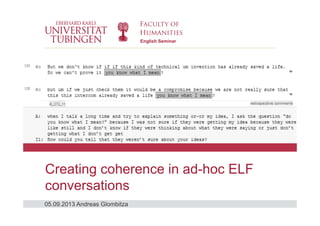
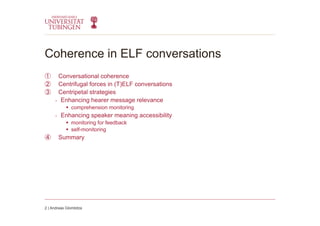
![Coherence in conversation
" [] What one speakers says in a conversation [is] heard as
following sensibly from what another has said [...]".
(Schiffrin 1985: 640)
Shared responsibility for coherence
-ÔÇ» "a speaker is expected to formulate an utterance so that its
message is accessible []".
´éºÔÇ» S signals what info will suffice as a minimally coherent response
-ÔÇ» "the hearer [ÔǪ] is expected to demonstrate, through the next
utterance, proper attention to that message."
´éºÔÇ» H signals coherence by providing that info or otherwise relating to it
3 | Andreas Glombitza](https://image.slidesharecdn.com/coherence-in-ad-hoc-elf-conversation-130912101849-phpapp02/85/Creating-Coherence-in-Ad-hoc-ELF-Conversations-3-320.jpg)
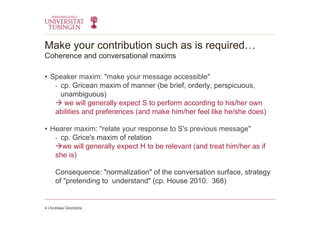
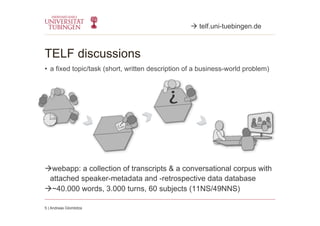
!["Centrifugal forces" in (T)ELF discussions
├á´âá loose overall discussion structure
tendency for "favourite individual topics" ("own agenda" cp. House 2002)
non-linear discussion process ("once again, back to start"), abrupt topic changes (cp.
Lesznyak 2002, House 2002)
speaker-meaning accessibility
creative/unconventional usage of words (reliance on "open choice", cp. Seidlhofer 2009)
"covert ambiguities" (e.g. stocks, recall)
ambiguous pronunciations (e.g. [recreate] for recruit)
interlocutors' general attention problems (due to monitoring strain)
hearer-message relevance
speaker meaning inaccessible (let-it-pass, "normalization" cp. House 2002, 2010)
lack of gambits / supporting moves (cp. House 2002)
hearer pursuing "own agenda
hearer message not accessible (see above)
6 | Andreas Glombitza](https://image.slidesharecdn.com/coherence-in-ad-hoc-elf-conversation-130912101849-phpapp02/85/Creating-Coherence-in-Ad-hoc-ELF-Conversations-6-320.jpg)
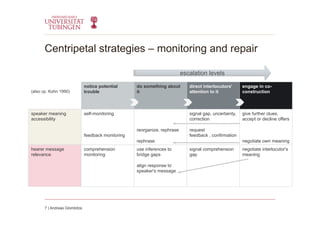
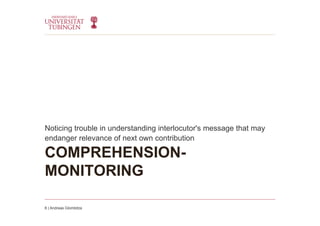
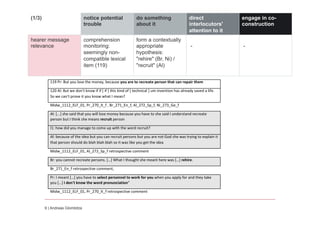
![10 | Andreas Glombitza
(2/3) notice potential
trouble
do something
about it
direct
interlocutors'
attention to it
engage in co-
construction
hearer message
relevance
comprehension
monitoring:
uncertain
illocutionary force /
propositional
content of Ja's
utterance (37)
form a contextually
appropriate
hypothesis about IF
and propositional
content (proposing
to wait)
revise hypothesis to
the effect that Ja
intends to warn (IF)
from potential side
effects of this plan
(waiting);
ask for confirmation
of hypothesis by
paraphrasing IF
and propositional
content of Ja's
previous turn (40)
get negative
response on
paraphrase and a
re-phrased
message from Ja
(41)
37
╠²Ja:
╠²[
╠²And
╠²so
╠²if
╠²]
╠²if
╠²we're
╠²if
╠²we're
╠²pushing
╠²this
╠²back
╠²what
╠²is
╠²that
╠²going
╠²to
╠²what
╠²is
╠²that
╠²going
╠²to
╠²
mean?
╠²I
╠²mean
╠²in
╠²certain
╠²circumstances
╠²I
╠²can
╠²see
╠²that
╠²m
╠²meaning
╠²that
╠²we
╠²would
╠²fold
╠²under
╠²the
╠²
pressure
╠²not
╠²having
╠²the
╠²right
╠²of
╠²a
╠²lot
╠²of
╠²money.
╠²But
╠²it's
╠²just
╠²an
╠²idea.
╠²
38
╠²El:
╠²Yea.
╠²
39
╠²Ja:
╠²Instead
╠²of
╠²no
╠²more.
╠²
40
╠²El:
╠²So
╠²you're
╠²you're
╠²proposing
╠²not
╠²to
╠²go
╠²public
╠²on
╠²that
╠²date,
╠²but
╠²to
╠²wait?
╠²[
╠²Are
╠²your
╠²argument
╠²]
╠²
41
╠²Ja:
╠²[
╠²Uhm
╠²no
╠²]
╠²I
╠²mean
╠²I
╠²I
╠²think
╠²that's
╠²a
╠²I
╠²think
╠²that's
╠²a
╠²great
╠²[
╠²idea
╠²],
╠²but
╠²I
╠²think
╠²another
╠²another
╠²
problem
╠²that
╠²we
╠²have
╠²another
╠²issue
╠²that
╠²we
╠²have
╠²to
╠²face
╠²is
╠²wha
╠²what
╠²does
╠²that
╠²what
╠²would
╠²that
╠²
mean
╠²for
╠²for
╠²a
╠²company
╠²for
╠²the
╠²money
╠²that
╠²we're
╠²we're
╠²going
╠²to
╠²become
╠²we're
╠²going
╠²to
╠²be
╠²uhm
╠²
bring
╠²in.
╠²
42
╠²El:
╠²That's
╠²a
╠²good
╠²point.
╠²
Midw_0910_ELF_05,
╠²Ja_247_En_m,
╠²El_246_It_f
╠²](https://image.slidesharecdn.com/coherence-in-ad-hoc-elf-conversation-130912101849-phpapp02/85/Creating-Coherence-in-Ad-hoc-ELF-Conversations-10-320.jpg)
![11 | Andreas Glombitza
(3/3) notice potential
trouble
do something
about it
direct
interlocutors'
attention to it
engage in co-
construction
hearer message
relevance
comprehension
monitoring:
uncertain
propositional
meaning
contribution of
"benefits" (41) phrase relevant
response (rejection
of Ta's argument)
(43)
utter item with rising
intonation; attach
"sorry" with rising
intonation
acknowledge
elaboration (43:
"yeah")
receive elaboration
on the previous
turn, focusing on
"benefits " (42)
Excerpt 23
╠²
39
╠²Ch:
╠²so
╠²if
╠²you
╠²are
╠²allowed
╠²to
╠²go
╠²or
╠²not
╠²yeah
╠²[
╠²maybe
╠²]
╠²
40
╠²Ta:
╠²[
╠²and
╠²how
╠²]
╠²it
╠²influences
╠²your
╠²benefits
╠²in
╠²that
╠²time
╠²
41
╠²Ch:
╠²benefits?
╠²sorry?
╠²
42
╠²Ta:
╠²benefits
╠²I
╠²mean
╠²the
╠²this
╠²company
╠²you've
╠²just
╠²said
╠²that
╠²it
╠²will
╠²take
╠²a
╠²long
╠²time
╠²to
╠²make
╠²a
╠²
control
╠²of
╠²all
╠²the
╠²things
╠²and
╠²in
╠²that
╠²time
╠²the
╠²company
╠²could
╠²have
╠²sold
╠²so
╠²many
╠²goods
╠²they
╠²were
╠²of
╠²
a
╠²good
╠²quality
╠²but
╠²they
╠²will
╠²influence
╠²their
╠²benefits
╠²
43
╠²Ch:
╠²yeah
╠²but
╠²isn't
╠²it
╠²possible
╠²to
╠²sell
╠²it
╠²parallelly
╠²
44
╠²Ta:
╠²parallelly?
╠²[
╠²what
╠²do
╠²you
╠²]
╠²mean?
╠²
45
╠²Ch:
╠²[
╠²yeah
╠²]
╠²
46
╠²Ch:
╠²at
╠²the
╠²same
╠²[
╠²time
╠²]
╠²
Midw_10_TELF_01,
╠²Ch_257_Ge_m,
╠²Ta_259_Ru_f
╠²](https://image.slidesharecdn.com/coherence-in-ad-hoc-elf-conversation-130912101849-phpapp02/85/Creating-Coherence-in-Ad-hoc-ELF-Conversations-11-320.jpg)
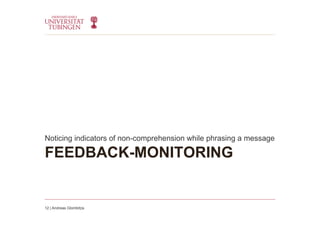
![13 | Andreas Glombitza
(2/2) notice potential
trouble
do something
about it
direct
interlocutors'
attention to it
engage in co-
construction
speaker meaning
accessibility
notice absence of
expected feedback
(receipts / okays /
go-ons)
proceed
elicit
feedback using
"appealer" moves
(cp. Edmondson/House
1981)
get confirmation
from Pr (121, 127)
120$Al:$But$we$don't$know$if$if$if$this$kind$of$technical$um$invention$has$already$saved$a$life.$So$we$
can't$prove$it$you$know$what$I$mean?$$
121$Pr:$yes$
[...]$
126$Al:$but$um$if$we$just$check$them$it$would$be$a$compromise$because$we$are$not$really$sure$that$
this$this$intercom$already$saved$a$life$you$know$what$I$mean?$$
127$Pr:$yes$
A:$when$I$talk$a$long$time$and$try$to$explain$something$orIor$my$idea,$I$ask$the$question$"do$you$
know$what$I$mean?"$because$I$was$not$sure$if$they$were$getting$my$idea$because$they$were$like$
still$and$I$donÔÇÖt$know$if$they$were$thinking$about$what$they$were$saying$or$just$donÔÇÖt$getting$what$I$
donÔÇÖt$get$get$$
I1:$How$could$you$tell$that$they$werenÔÇÖt$sure$about$your$ideas?$$
A:$because$nobody$was$saying$like$okay$okay$or$saying$nothing.$They$just$aaah$were$silent.$
Midw_1112_ELF_01,$Pr_270_It_f$,$Al_272_Sp_f$retrospective$comment$](https://image.slidesharecdn.com/coherence-in-ad-hoc-elf-conversation-130912101849-phpapp02/85/Creating-Coherence-in-Ad-hoc-ELF-Conversations-13-320.jpg)
![14 | Andreas Glombitza
(2/2) notice potential
trouble
do something
about it
direct
interlocutors'
attention to it
engage in co-
construction
speaker meaning
accessibility
feedback
monitoring: notice
attributable silence
on part of
interlocutor (146)
repeat and
rephrase previous
message (149)
(cp. Kaur 2012)
ask for
comprehension
(potential FTA, 147)
receive uncertain
answer from Da
(148)
140$Ja:$(to$Da)$I$don't$think$so$because$the$is$uhm$also$the$pediatrics$they$commended$it$to$the$
customers$just$for$this$one$function$what$is$to$monitor$a$baby's$pulse$rate$[$and$][141$Jo:$Mhm$
][142$Da:$Mhm$]$$it's$really$what$says$it$I$think$because$you$have$a$lot$of$intercoms$for$babies$but$
this$one$is$specif$specific$with$[$this$function$]$[143$Jo:$Mhm$]$and$I$think$if$you$want$just$an$just$
intercom$if$you$buy$just$intercom,$but$if$you$want$this$one$[$you$]$[144$Jo:$yea$]$buy$this$one$
because$of$the$function$and$I$don't$think$so$if$you$buy$it$you$don't$use$it,$it's$nonsense.$[$You$]$[145$
Jo:$Yea$uhm]$buy$it$because$you$want$use$it$and$you$can$can't$not$that$uhm$from$the$10,000$just$
to$use$it$you$cannot$count$it$because$I$think$the$people$know$what$they$bought$and$they$use$it$for$
this$reason$
146$Da:$(long$pause)$Mhm$$right$
147$Ja:$(to$Da)$Do#understand#what#I#mean?$
148$Da:$Yea$I$think$so.$Uhm$
149$Ja:$It$will$be$something$else$if$it$will$be$just$one$function$of$many$
150$Da:$Mhm$
151$Ja:$but$I$think$it's$in$this$case$it's$the$main$function$
152$Jo:$Ja$f$alright$
153:$Da:$Right$right$[well$I$think$]$that$this$
Ja:$Erm$IÔÇÖm$still$not$sure$that$Da$did$understand$the$thing$I$tried$to$explain$it$but$IÔÇÖm$not$sure$itÔÇÖs$
okay$letÔÇÖs$see$maybe$it$will$be$okay$just$erm$confused$if$we$are$on$the$same$line$
$
Midw_08_NNSD_04,
╠²Ja_008
╠²retrospec7ve
╠²comment
╠²](https://image.slidesharecdn.com/coherence-in-ad-hoc-elf-conversation-130912101849-phpapp02/85/Creating-Coherence-in-Ad-hoc-ELF-Conversations-14-320.jpg)
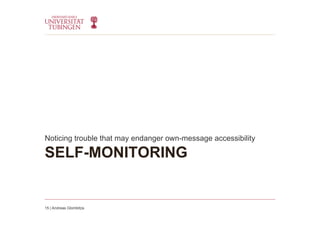
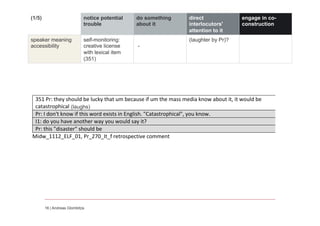
![17 | Andreas Glombitza
(2/5)* notice potential
trouble
do something
about it
direct
interlocutors'
attention to it
engage in co-
construction
speaker meaning
accessibility
self-monitoring: ?
avoid conditional
construction?
incongruent choice
of personal pronoun
self-initiated
rephrasal to "it's not
a
problem" (simplify)
self-initated self-
correction to "they"
signal correction
"uhm" (cp. Clark
and Fox Tree 2002)
-
18
╠²Ed:
╠²Yea,
╠²I
╠²think
╠²that
╠²uhm
╠²if
╠²the
╠²purpose
╠²of
╠²the
╠²company
╠²is
╠²uhm
╠²earn
╠²earn
╠²money
╠²it
╠²doesn't
╠²
matter,
╠²it
╠²doesn't
╠²uhm
╠²it's
╠²not
╠²it's
╠²not
╠²a
╠²problem,
╠²yea?
╠²But
╠²if
╠²you
╠²uhm
╠²think
╠²in
╠²a
╠²social
╠²err
╠²point
╠²of
╠²
view
╠²it
╠²could
╠²be
╠²err
╠²a
╠²problem,
╠²yea?
╠²Because
╠²uhm
╠²it
╠²is
╠²a
╠²part
╠²of
╠²some
╠²uhm
╠²I
╠²don't
╠²know
╠²solution,
╠²it
╠²
could
╠²be
╠²a
╠²good
╠²solution
╠²for
╠²uhm
╠²the
╠²so
╠²only
╠²infant
╠²death,
╠²yea?
╠²It
╠²doesn't
╠²work
╠²err
╠²well
╠²so
╠²he
╠²have
╠²
to
╠²they
╠²have
╠²to
╠²improve
╠²something
╠²err
╠²better
╠²to
╠²to
╠²get
╠²uhm
╠²good
╠²err
╠²solution
╠²or
╠²everything.
╠²
Midw_07_MON_03,
╠²Ed_033_Sp_m
╠²
╠²
118
╠²Al
╠²:
╠²[
╠²Yea
╠²],
╠²but
╠²how
╠²[
╠²do
╠²you
╠²know
╠²it
╠²]?
╠²[
╠²How
╠²do
╠²you
╠²know
╠²it
╠²doesn't
╠²work?
╠²]
╠²[
╠²because
╠²it
╠²
doesn't
╠²make
╠²]
╠²it
╠²doesn't
╠²i
╠²it
╠²doesn't
╠²make
╠²any
╠²sounds
╠²[
╠²so
╠²if
╠²the
╠²if
╠²the
╠²]
╠²if
╠²the
╠²baby
╠²is
╠²not
╠²good
╠²
good
╠²good?
╠²Err
╠²healthy
╠²yea
╠²uhm
╠²yo
╠²you're
╠²just
╠²not
╠²gonna
╠²know
╠²[
╠²because
╠²if
╠²]
╠²it
╠²doesn't
╠²make
╠²any
╠²
sounds
╠²I
╠²err
╠²f
╠²soun.
╠²I
╠²thi
╠²yea
╠²err
╠²I
╠²think
╠²it's
╠²a
╠²good
╠²sign
╠²so
╠²[
╠²that's
╠²the
╠²problem
╠²].
╠²
Midw_08_NNSD_05,
╠²Al_001_Fr_m
╠²
╠²
8
╠²Jo:
╠²mhm
╠²but
╠²erm
╠²the
╠²sensors
╠²(hesitatingly)
╠²are
╠²not
╠²one
╠²of
╠²is
╠²
╠²(opens
╠²both
╠²hands)
╠²arenÔÇÖt
╠²
╠²our
╠²
product.
╠²
╠²](https://image.slidesharecdn.com/coherence-in-ad-hoc-elf-conversation-130912101849-phpapp02/85/Creating-Coherence-in-Ad-hoc-ELF-Conversations-17-320.jpg)
![18 | Andreas Glombitza
(3/5) notice potential
trouble
do something
about it
direct
interlocutors'
attention to it
engage in co-
construction
speaker meaning
accessibility
self-monitoring:
lexical gap
use "headphones"
gestural: both index
fingers to own ears
accept lexical item
by Sr "headphones"
So:
╠²but
╠²maybe
╠²it
╠²is
╠²more
╠²like
╠²that
╠²than
╠²the
╠²I
╠²don't
╠²know
╠²how
╠²it
╠²is
╠²said
╠²(gestures
╠²to
╠²own
╠²ears)
╠²[
╠²
╠²
╠²]
╠²
headphones
╠²yeah
╠²and
╠²that
╠²[
╠²the
╠²the
╠²is
╠²working
╠²good
╠²]
╠²
Sr:
╠²[
╠²headphones
╠²]
╠²
Ma:
╠²[
╠²phones?
╠²]
╠²
Lu:
╠²[
╠²so
╠²that
╠²there
╠²is
╠²no
╠²risk
╠²]
╠²
So:
╠²no
╠²um
╠²of
╠²course
╠²but
╠²I
╠²mean
╠²if
╠²if
╠²you
╠²can
╠²use
╠²it
╠²without
╠²um
╠²if
╠²you
╠²are
╠²going
╠²to
╠²use
╠²it
╠²without
╠²
that
╠²hairphones
╠²
╠²
╠²
Midw_1011_ELF_03, So_260_Sp_f, Sr_261_Ma_m, Ma_262_En_f, Lu_264_Sp_f](https://image.slidesharecdn.com/coherence-in-ad-hoc-elf-conversation-130912101849-phpapp02/85/Creating-Coherence-in-Ad-hoc-ELF-Conversations-18-320.jpg)
![19 | Andreas Glombitza
(4/5)* notice potential
trouble
do something
about it
direct
interlocutors'
attention to it
engage in co-
construction
speaker meaning
accessibility
self-monitoring:
lexical gap (115)
use "screws"
verbal: "how do
you"
gestural: index
fingers to
neighbour's glasses
reject first lexical item
(glasses); narrow
target concept;
ask confirmation for
second lexical item
(screws, 117); accept
second lexical item
115
╠²Ed:
╠²Mhm,
╠²it
╠²would
╠²be
╠²better
╠²because,
╠²I
╠²don't
╠²know,
╠²it's
╠²for
╠²example
╠²like
╠²uhm
╠²as
╠²a
╠²company
╠²
who
╠²who
╠²made
╠²a
╠²who
╠²make
╠²a
╠²how
╠²do
╠²you,
╠²how
╠²do
╠²(touches
╠²the
╠²frame
╠²of
╠²Ke's
╠²glasses)
╠²[
╠²you
╠²call
╠²
the
╠²]
╠²err
╠²no
╠²err
╠²the
╠²little
╠²[
╠²pieces
╠²]
╠²of
╠²err
╠²screws?
╠²
116
╠²Ke:
╠²[The
╠²glasses?]
╠²
117
╠²Ke:
╠²[Screws?]
╠²
118
╠²Ke:
╠²Yea
╠²like
╠²screwing,
╠²you
╠²know?
╠²(turns
╠²hand
╠²like
╠²with
╠²a
╠²screwdriver)
╠²
119:
╠²Ed:
╠²Yea
╠²like
╠²screws
╠²who
╠²who
╠²make
╠²a
╠²company
╠²who
╠²make
╠²this
╠²uhm
╠²things.
╠²Maybe
╠²they
╠²uhm
╠²
just
╠²produce
╠²it,
╠²but
╠²uhm
╠²I
╠²don't
╠²know
╠²maybe
╠²another
╠²company
╠²use
╠²that
╠²uhm
╠²to
╠²to
╠²make
╠²guns
╠²yea
╠²
and
╠²it's
╠²not
╠²uhm
╠²them
╠²fault.
╠²
╠²
╠²Midw_07_MON_03,
╠²Ed_033_Sp_m,
╠²Ke_109_En_m
╠²](https://image.slidesharecdn.com/coherence-in-ad-hoc-elf-conversation-130912101849-phpapp02/85/Creating-Coherence-in-Ad-hoc-ELF-Conversations-19-320.jpg)
